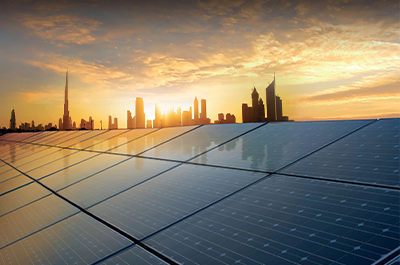
In recent years, Dubai has not only emerged as a global hub for commerce and tourism but also as a leader in sustainable living initiatives. Known for its iconic skyline and luxurious lifestyle, Dubai has taken significant strides towards embracing sustainability across various sectors, aiming to create a greener, more environmentally conscious future.
From ambitious renewable energy projects to innovative urban planning strategies, Dubai's commitment to sustainability is evident. We've compiled this guide to showcase the city's actionable steps towards a more sustainable future.
1. Renewable Energy Revolution
At the forefront of Dubai's sustainability drive is its ambitious renewable energy agenda. The city is home to the Mohammed bin Rashid Al Maktoum Solar Park, one of the largest solar energy projects in the world. This mega-project aims to generate 5,000 megawatts (MW) of clean energy by 2030, reducing carbon emissions and promoting energy independence. Additionally, Dubai has been diversifying its energy portfolio and reducing its reliance on fossil fuels.
The UAE is pioneering groundbreaking renewable energy and energy efficiency programs, driven by a clear understanding of climate change impacts. The UAE’s Net Zero 2050 strategy aims for a diverse energy mix by 2050, including 44% clean energy, 38% gas, 12% clean coal, and 6% nuclear. The nation plans to achieve carbon neutrality by 2050 as well.
2. Green Building Standards
Dubai's skyline is synonymous with cutting-edge architecture, and the city is now incorporating sustainability into its urban development plans. The Dubai Municipality has implemented stringent green building standards, mandating the use of energy-efficient materials and design practices in construction projects. The Leadership in Energy and Environmental Design (LEED) certification and the Dubai Green Building Regulations and Specifications ensure that new buildings meet strict environmental criteria, reducing energy consumption and minimizing environmental impact.
3. Water Conservation Initiatives
In a region known for its dry climate, water conservation is critical. Dubai has implemented innovative initiatives to reduce water consumption and promote sustainable usage practices. These include the widespread adoption of drip irrigation systems in landscaping, the use of greywater recycling technologies in buildings, and the promotion of xeriscaping techniques to minimize outdoor water usage. Additionally, the Dubai Electricity and Water Authority (DEWA) has launched several awareness campaigns to educate residents and businesses about the importance of water conservation. In 2023, DEWA launched the "Make Smart Summer Choices Your Habit" campaign to promote efficient electricity and water usage among residential customers through its smart app, allowing users to track consumption and save money.
4. Smart City Solutions
Dubai is leveraging technology to enhance sustainability through its smart city initiatives. The Dubai Smart City project integrates data analytics, IoT sensors, and advanced infrastructure to optimize resource management and improve quality of life. Smart transportation systems, including electric vehicle charging stations and autonomous vehicles, reduce carbon emissions and alleviate traffic congestion. Furthermore, smart grids and digital metering enable efficient energy distribution and monitoring of consumption, encouraging residents to make informed decisions about resource usage.
5. Sustainable Tourism Practices
As a premier tourist destination, Dubai recognizes the importance of sustainable tourism in preserving its natural resources and cultural heritage. The Dubai Sustainable Tourism Initiative promotes responsible tourism practices, encouraging hotels, resorts, and tour operators to minimize their environmental footprint.
Earlier this year, the city introduced the Dubai Sustainable Tourism (DST) stamp, a collaborative effort with the hotel sector. The stamp aims to recognize hotels demonstrating exceptional commitment to the 19 Sustainability Requirements, fostering a culture of sustainability and enabling hotels to communicate their eco-friendly practices to environmentally conscious tourists.


